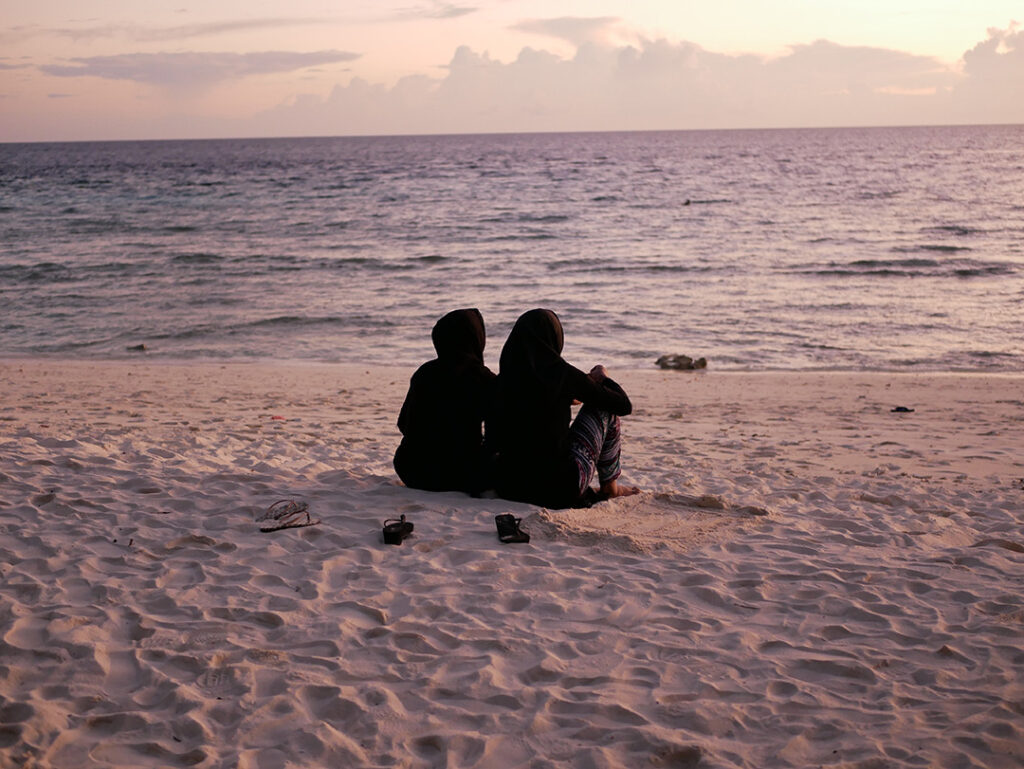France’s struggle with clothing in Islam
France’s struggle with clothing in Islam
Our analyst Muhammad Faisal Khalil examines the status of Islamic clothing in France, not merely as a point of contention but as a reflection of broader dynamics.
This weekly comment was written by Muhammad Faisal Khalil and reflects his personal analyses and opinions, rather than those of EARS.
In recent years, France has faced intense scrutiny regarding its relationship with its Muslim population, particularly in regard to the clothing worn by Muslim women. The burkini and the abaya, in particular, have become symbols of the broader cultural and political tensions in the country.
Battles over clothing
The burkini, a full-body swimsuit designed by Australian entrepreneur Aheda Zanetti in 2003, was intended to enable Muslim women to engage in water activities without compromising their religious beliefs.[1] However, in France, it has sparked controversy. Several cities attempted to ban it, citing reasons from public safety to the preservation of secular values. Although the Conseil d’État, France’s highest administrative court, overturned these bans, the debate continues. This reveals deep-seated concerns about Muslim integration.[2]
The abaya, a traditional full-length dress, has also been at the centre of controversy. The Conseil d’État recently upheld a ban on the garment in schools, based on a 2004 law that prohibits overt religious symbols in public schools.[3] This decision faced criticism, particularly because of Conseil d’État’s inaccurate characterisation of the abaya. French legal scholar and commentator, Rim-Sarah Alouane, pointed out this mischaracterisation, emphasising the potential for misidentifications, especially during colder seasons when similar clothing might be worn by anyone.[4]
This ban on the abaya in schools has reignited debates about France’s principle of laïcité or secularism. While previously the enforcement of the 2004 rules was at the discretion of individual school principals, the government felt a nationwide ban was necessary due to increasing disputes related to secularism in schools.[5] The decision has been both supported and criticised across the political spectrum in France. Parties like France Insoumise have condemned the ban, accusing the government of being “obsessed” with Muslims.[6]
President Emmanuel Macron has remained firm on the issue, emphasising that religious symbols have no place in French schools. He stated, “Schools in our country are secular, free, and compulsory. But they are secular. Because this is the very condition that makes citizenship possible and therefore religious symbols of any kind have no place in them. And we will vigorously defend this secularism.”[7]
However, rights groups, such as Action Droits Des Musulmans (ADM), argue that the ban infringes on fundamental rights, including personal freedom. Vincent Brengarth, the group’s lawyer, highlighted the “arbitrary” nature of the ban, pointing out its lack of a clear legal definition for the abaya.[8] ADM expressed concerns about potential discrimination against Muslim students, emphasising the daily discrimination and trauma these young girls might face due to their ethnic and religious appearance.[9]
Not just about clothing
The ongoing debates in France surrounding Islamic clothing, such as the burkini and the abaya, go deeper than just clothing choices. These garments have taken on profound symbolic meanings within the context of France’s secular but diverse landscape. For some, as President Emmanuel Macron emphasised, they challenge the secular fabric of French institutions. Yet, for others, particularly Muslim women, they signify personal freedom, religious devotion, and cultural identity.
The discourse around Islamic clothing underscores the dichotomy prevalent in diverse societies, where visible markers differentiate one group from another. This can lead to tensions, especially when one group perceives its identity as threatened. This tension is evident in France’s contentious decisions, from the burkini bans to the prohibition of the niqab (veil), which the United Nations Human Rights Committee even deemed a violation of human rights in 2018.[10]
France’s secular policies, such as the ban on religious symbols in public schools, can be seen as attempts to maintain social equilibrium. However, as France’s demographic landscape evolves, these policies are increasingly challenged by emerging cultural nuances, leading to potential disruptions. Furthermore, the present-day tensions echo France’s past engagements in predominantly Muslim territories. The current debates are not isolated incidents but are intertwined with France’s colonial legacy, where the colonisers often asserted their superiority over the colonised.
The debate in France about Islamic clothing represents, therefore, not merely a point of contention but a reflection of broader dynamics. The ongoing controversies underscore the nation’s struggle to balance its secular identity with the rights and freedoms of its diverse population.
This weekly comment was written by Muhammad Faisal Khalil and reflects his personal analyses and opinions, rather than those of EARS.
Interested in similar topics? Go to our Dashboard.
Sources
[1] The French obsession with Muslim swimwear – Hyphen
[2] The French obsession with Muslim swimwear – Hyphen
[3] Top French Court Upholds Abaya Ban in Schools – The New York Times
[4] Rim-Sarah Alouane @RimSarah
[5] French shrug off Muslim upset at abaya ban in schools – BBC News
[6] French shrug off Muslim upset at abaya ban in schools – BBC News
[7] Macron says enforcement of abaya ban in French school will be ‘uncompromising’
[8] French court upholds abaya ban in public schools | CNN






